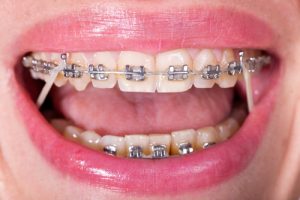Managing Braces Pain and Discomfort
How to Deal With the Pain of Braces

From over-the-counter pain relief options to oral care tips and coping strategies, we’ve got you covered. Learn how to deal with the pain of braces, ensuring a smoother and more comfortable journey toward a confident smile.
Why Are Braces Causing Pain?
If you are currently undergoing orthodontic treatment with braces, it’s not uncommon to experience some discomfort or pain. This pain can vary from mild soreness to more intense discomfort. Understanding why braces can cause pain can help you manage and alleviate any discomfort you may be experiencing.
- Initial adjustment period
- Soft tissue irritation
- Pressure on teeth
- Alignment changes
- Wire adjustments
- Loose brackets or wires
Managing Pain From Braces
Over-the-Counter Pain Relievers: Your Ally in Discomfort
When you’re experiencing pain from braces, over-the-counter pain relievers such as ibuprofen or acetaminophen can be a valuable tool. These medications can help reduce inflammation and provide temporary relief from soreness. Remember to follow the recommended dosage and consult your orthodontist or healthcare professional before taking any medication.
Cold Compresses: A Cool Remedy
Applying a cold compress to the outside of your mouth can help numb the area and alleviate discomfort. Simply wrap an ice pack or a bag of frozen vegetables in a thin cloth and gently press it against the sore areas for 10 to 15 minutes. This technique can provide temporary relief and reduce swelling.
Saltwater Rinse: A Soothing Solution
Rinsingyour mouth with warm saltwater is a time-tested remedy for oral pain. Dissolve half a teaspoon of salt in a glass of warm water, and swish it around your mouth for 30 seconds before spitting it out. Saltwater rinse helps reduce inflammation, disinfect the area, and promote faster healing.
Oral Anesthetic Gel: Numbing the Discomfort
Over-the-counter oral anesthetic gels, such as benzocaine, can provide temporary relief from braces pain. Apply a small amount of gel to the affected areas according to the product instructions. The gel will temporarily numb the area, reducing discomfort.
Soft Food Diet: Give Your Teeth a Break

Orthodontic Wax: Creating a Protective Barrier
Orthodontic wax is a simple solution for preventing irritation and minimizing pain caused by braces. Apply a small amount of wax to any brackets or wires causing discomfort, creating a protective barrier between your braces and the inside of your mouth.
The Importance of Proper Oral Hygiene for Braces
Maintaining proper oral hygiene is crucial when wearing braces to prevent additional discomfort and ensure the health of your teeth and gums.
Here are some essential tips for oral care during orthodontic treatment:
- Brush Teeth After Meals: Use a soft-bristle toothbrush and fluoride toothpaste to clean your teeth thoroughly. Pay special attention to brushing around the brackets and wires to remove any food particles or plaque buildup.
- Floss Regularly: Flossing with braces can be challenging but is essential for removing debris and preventing gum disease. Consider using a floss threader or orthodontic floss to navigate between the wires and reach the gum line.
- Rinse with Mouthwash: Incorporating an antimicrobial mouthwash into your oral care routine can help kill bacteria and freshen your breath. Choose a mouthwash that’s suitable for orthodontic patients.
Communicating with Your Orthodontist
Open communication with your orthodontist is vital throughout your braces journey. They’re your partners in achieving a beautiful smile and can provide guidance and solutions to address any concerns or pain you may experience.
Here’s how to effectively communicate with your orthodontist:
- Attend Regular Checkups: Be diligent about attending your scheduled orthodontic appointments. These visits allow your orthodontist to assess your progress, make adjustments, and address any discomfort or issues.
- Express Your Concerns: If you’re experiencing persistent or severe pain, don’t hesitate to voice your concerns to your orthodontist. They can evaluate your situation, offer appropriate solutions, and ensure your treatment is on track.
- Follow Instructions: Your orthodontist will provide specific instructions regarding oral care, diet, and additional recommendations. Adhere to these instructions to ensure the best possible outcome and minimize discomfort.
Don’t Live With Braces Pain: Consult Our Top-Rated Orthodontist
Dealing with the pain of braces is a common aspect of orthodontic treatment, but it doesn’t have to be overwhelming. By implementing the strategies from your orthodontist, you can effectively manage and alleviate the discomfort associated with braces. Learn more by scheduling a consultation with Dr. Grussmark by calling our Miami, FL, office at (305) 441-1200 or by filling out our online contact form.

